32 stranded chimpanzees need permanent new homes
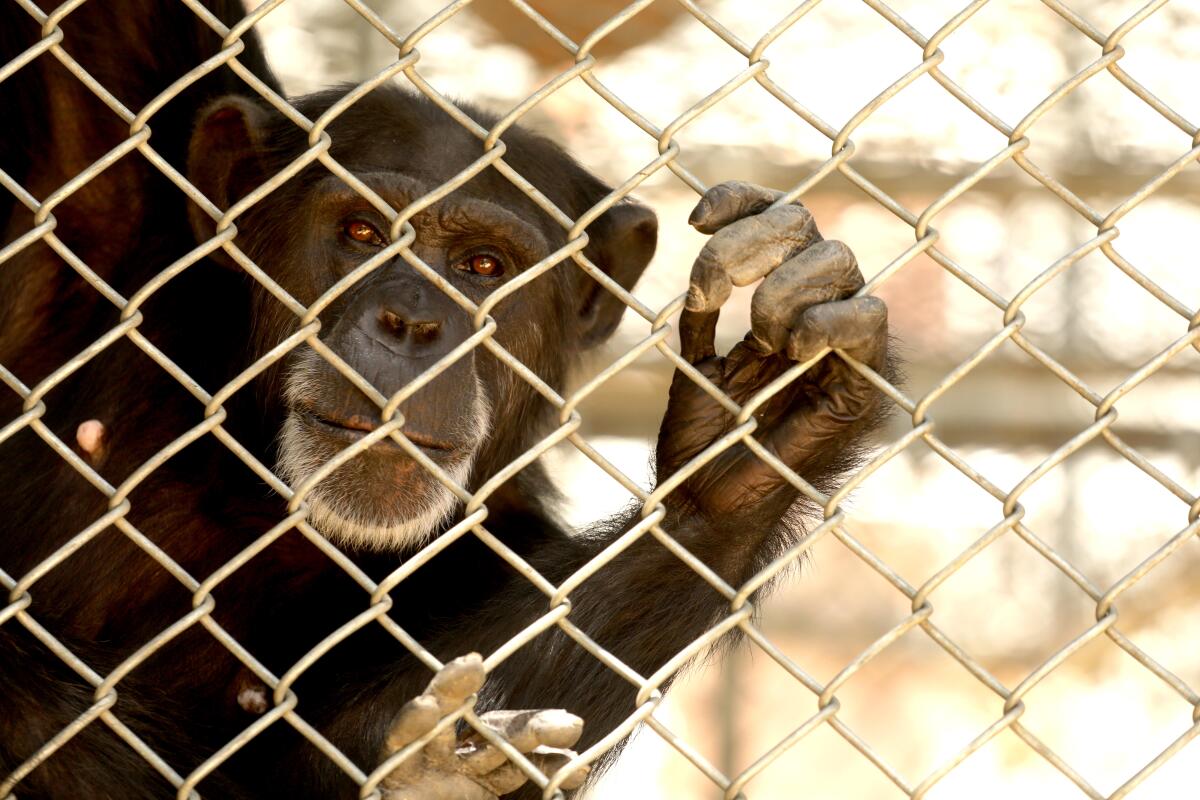
- Share via
The fates of 32 chimpanzees stranded in the shuttered Wildlife Waystation in the Angeles National Forest depend on raising the funds needed to build permanent new homes at sanctuaries willing to take them, officials said on Tuesday.
More than 500 exotic animals, including lions, tigers, alligators, wolves, owls and Vietnamese potbellied pigs, have been relocated since the troubled 44-year-old center surrendered its California Department of Fish and Wildlife permits and shut down for good a year ago.
The challenge now will be raising the estimated $10 million it will take to continue caring for the chimps and installing accommodations for them at the Center for Great Apes in Florida, Primarily Primates Inc. in Texas, Chimp Haven Inc. in Louisiana and Chimpanzee Sanctuary Northwest in Washington.
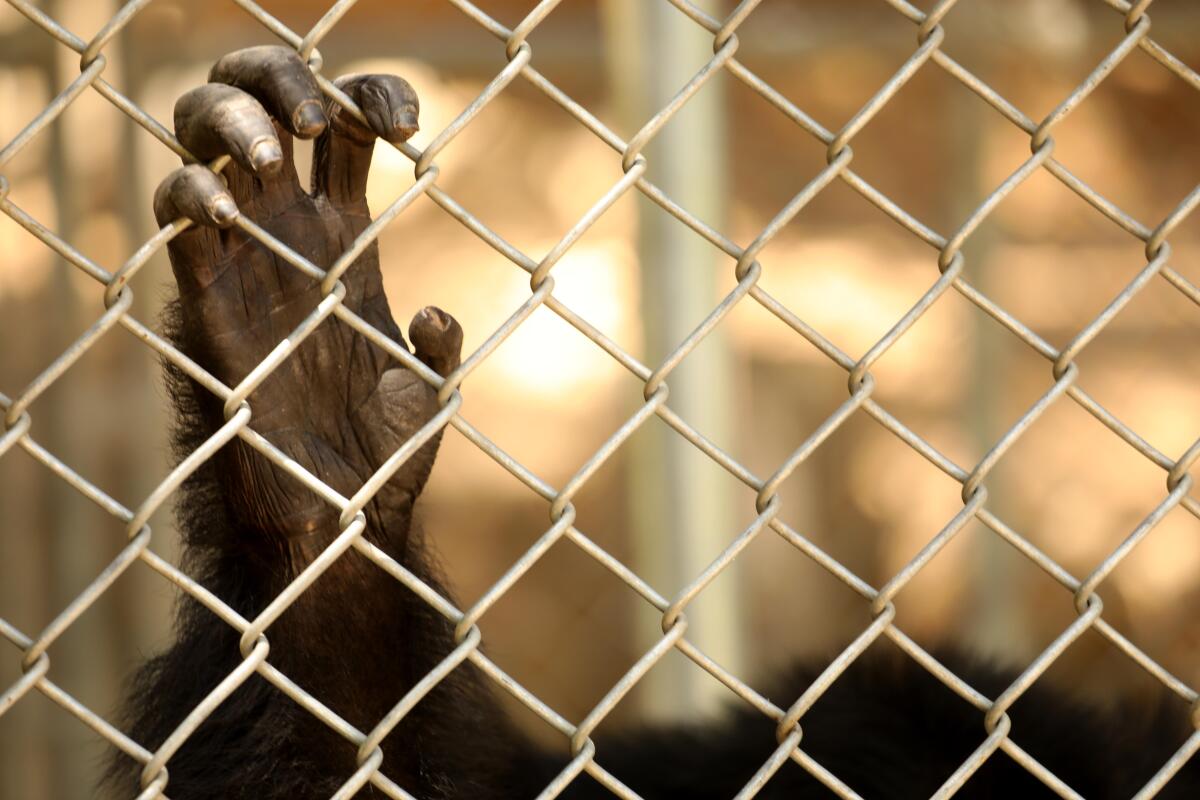
“The problem is that sanctuaries are at capacity because demand has skyrocketed since the use of chimps in research laboratories ended in 2016,” said Erika Fleury, spokeswoman for the nonprofit North American Primate Sanctuary Alliance.
“For these agile and intelligent animals,” she said, “enclosures have to be large and strong for them to stay busy and happy — and ongoing care for them is a complex and costly matter.”
“But they are innocents,” she added. “They were brought into this world to benefit humans who used them as exotic pets and living test tubes.”
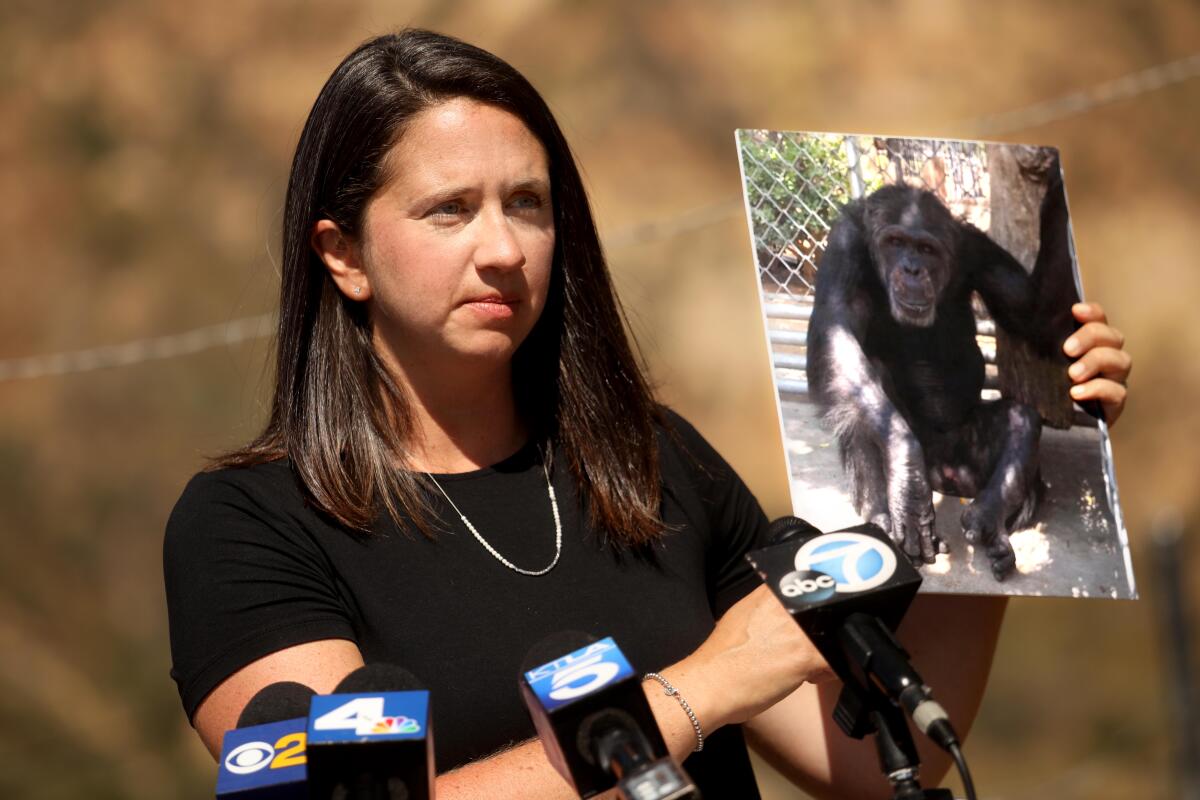
The chimps living within the 160-acre center, which was briefly opened Tuesday to help spread the word among potential donors, include Jeff, a 45-year-old amicable but assertive leader of a social group that includes his 15-year-old daughter Magic, who was born in the facility.
“If Jeff was a human politician, he’d be president by now,” said Anher Flores, 37, a caretaker whose emphasis on creature comforts and animal welfare includes treating the chimps to red licorice candy and fresh red apples.
As for Magic, he said, “We had no idea she was coming. When we watched her being born, it seemed a wonderful miracle. That’s why we named her Magic.”
Then there’s Mystery, a chimp rescued from a biomedical laboratory who enjoys fresh fruit, banana bread and snuggling with blankets.
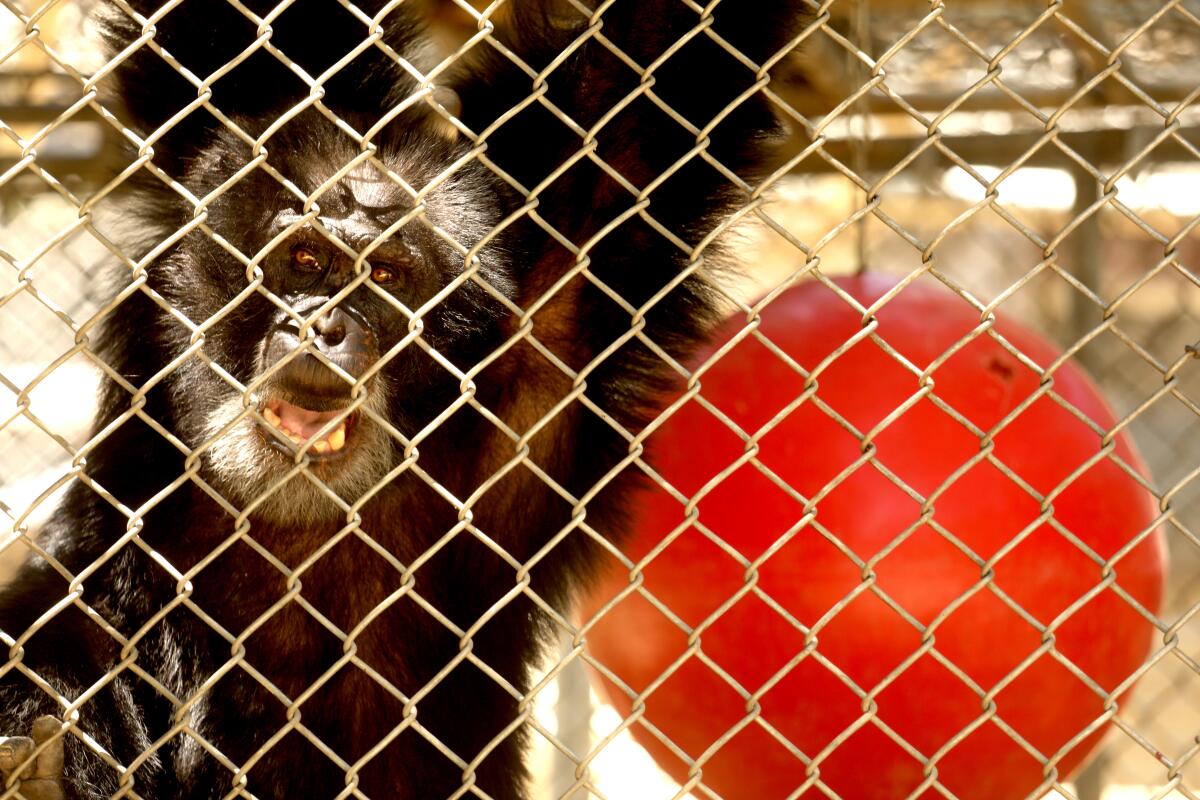
The state Department of Fish and Wildlife has been making monthly payments of about $100,000 to sustain the chimps and maintain the facility with food, water, veterinary care, insurance and security, officials said. It has partnered with the California Department of Forestry and Fire Protection on fuel reduction projects in the surrounding slopes.
“The situation was so dire when the Waystation surrendered its restricted species permit,” recalled Ed Pert, a spokesman for the department, “that we had to step up and ensure that something horrible didn’t happen to the animals.”
“We also started taking a hard look at regulations governing facilities like this one,” he added, “to ensure this never happens again.”
The Waystation grew from a small volunteer-run refuge for abused, abandoned and sick animals into an internationally known refuge for exotic animals in little more than two decades. Funded solely by private donations, the “ranch,” as it was called by employees, provided homes for more than 1,000 animals.
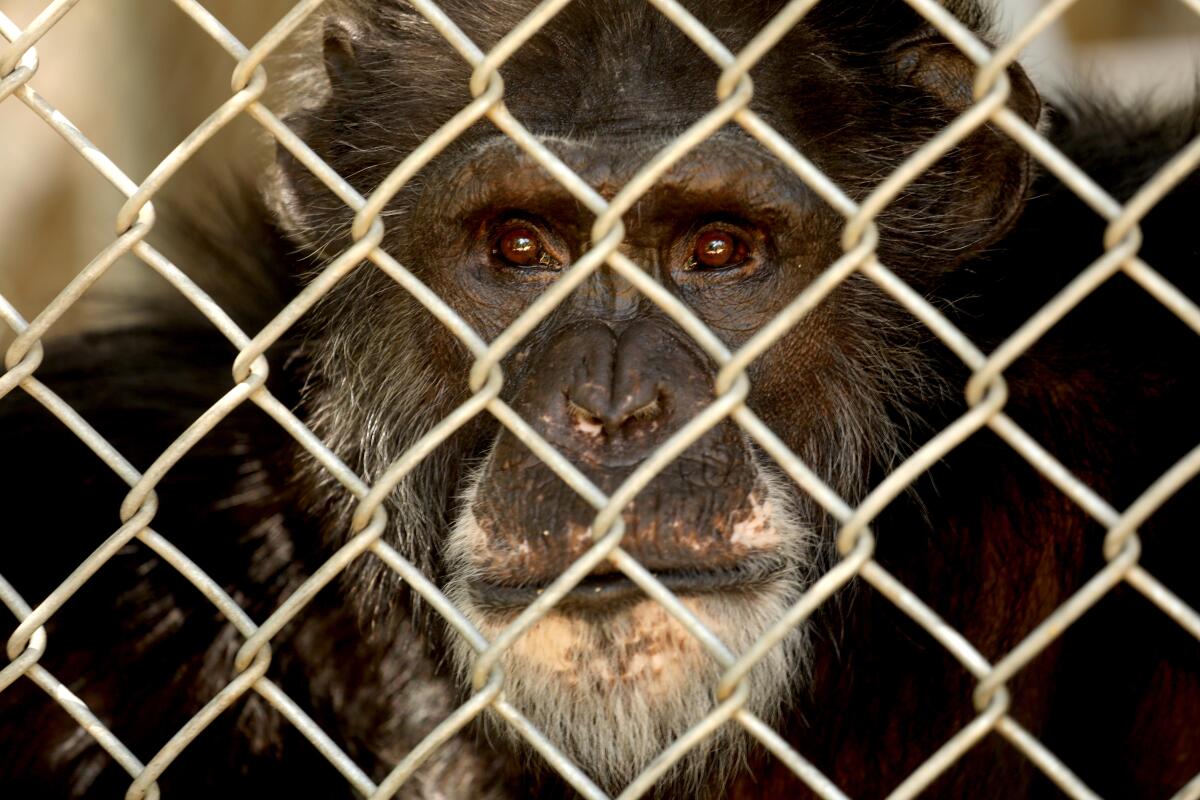
Over the years, its founder, Martine Colette, a dedicated animal welfare advocate, charmed Hollywood celebrities such as Bruce Willis, Will Smith and Drew Barrymore into opening their wallets for her cause.
The Waystation filled a need by taking in animals from research labs and abandoned from private collections and roadside attractions, as well as many other injured and orphaned animals, and housing them until they found a home.
In 1995, the Waystation accepted its first animals retired from medical research, eight chimpanzees from New York University. Other primates followed, and the Waystation began construction on a massive primate-retirement home in a remote area of the ranch.
The compound was built specifically for “retired” chimps and included a 7,000-square-foot enclosed building as well as several open “play yards.” It was able to accommodate 75 to 100 chimps.
A few years after the compound opened, however, federal, state and Los Angeles County animal welfare authorities began scrutinizing the Waystation, one of the largest of its kind, for alleged environmental and animal-safety violations.
Authorities closed the facility to the public in 2001 and barred it from taking in additional sick, injured or abandoned animals. A year later, federal authorities suspended operations after inspections revealed that the Waystation had not fixed long-standing crowded, unsanitary and unsafe conditions.
The Waystation’s license was reinstated after it spent $2 million to bring habitation for animals into compliance.
But the facility, just outside Los Angeles city limits, suffered extensive damage in the 2017 Creek Fire near Tujunga, followed by severe flooding two years later.
Colette resigned in 2019 as president and chief operating officer. A short while later, Waystation’s board of directors voted to close the facility and assist state Fish and Wildlife officials in finding new homes for its animals.
As of Tuesday, the only animals left in spider web-like networks of wire cages and pens maintained by a cadre of volunteers included the chimps, three baboons, two hybrid wolf dogs and several exotic birds.
Terry Tamminen, president of the nonprofit 7th Generation Advisors and former secretary of the California Environmental Protection Agency, acknowledged that critics might ask whether this is a proper time, given everything going on in the U.S. and the world, to be seeking donations “to help some animals.”
“We’ve all been witnessing history in the making in the Black Lives Matter protests and supporting social justice efforts,” he said. “And these dynamics are set against the backdrop of the climate crisis and so many other issues that nonprofits and government are tackling every day.”
So, why donate to the chimps? “The answer for me,” he said, is “because humans put these chimps in harm’s way in the first place, robbing them of a healthy, happy fulfilling natural life — and because we’re the only ones who can right the wrong.”









